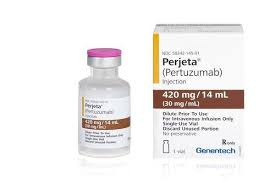The Ministry of Health and Welfare has granted additional reimbursement to Roche’s breast cancer therapy Perjeta (ingredient: pertuzumab) as a preoperative adjuvant therapy during the early stages of human epidermal growth factor receptor 2 (HER2)-positive breast cancer.

The ministry has also expanded the scope of health insurance coverage from postoperative adjuvant therapy to combination therapies except for Perjeta.
The expanded reimbursement comes after the ministry approving Perjeta as a first-line treatment for patients with HER2-positive metastatic or non-resectable local recurrent breast cancer who have not received anti-HER2 therapy in April last year.
Under the new insurance plans, the ministry adjusted the financial burden ratio for patients with locally advanced, inflammatory or early-stage HER2-positive breast cancer receiving Perjeta in combination with Herceptin and docetaxel as part of a treatment regimen, including fluorouracil, epirubicin and cyclophosphamide or carboplatin in preoperative adjuvant therapy to 30 percent.
Also, for preoperative adjuvant therapy, a 5 percent co-payment applies to combination therapies except for Perjeta, while adjuvant therapy for HER2-positive breast cancer with lymph node-positive HER2-positive breast cancer patients will also reduce the patient’s financial burden to 5 percent for a combination therapy excluding Perjeta.
“Roche develops and supplies optimal treatment options for HER2-positive breast cancer therapies, including preoperative and postoperative adjuvant therapy,” Roche Korea CEO Nic Horridge said. “We will continue to focus on increasing patient access and expanding access to therapies so that more innovative therapies can help breast cancer patients.”
Perjeta is a drug that prevents the HER2 receptor from pairing or dimerizing with other HER receptors (EGFR/HER1, HER3, and HER4) on the surface of cells, a process believed to play a significant role in tumor growth and survival. Binding of Perjeta to HER2 may also signal the body’s immune system to destroy the cancer cells.

